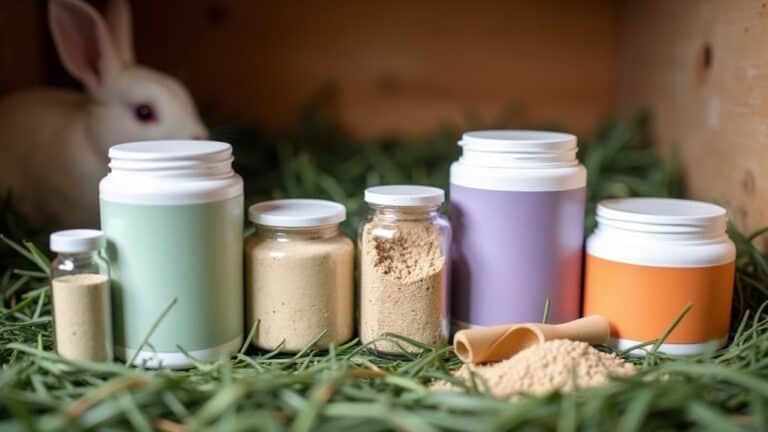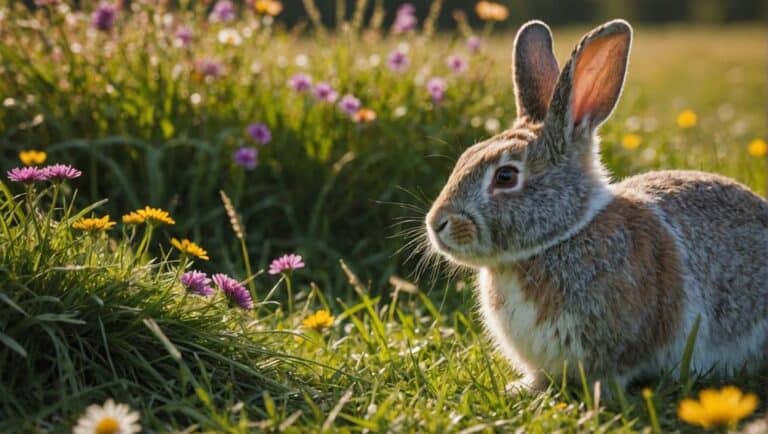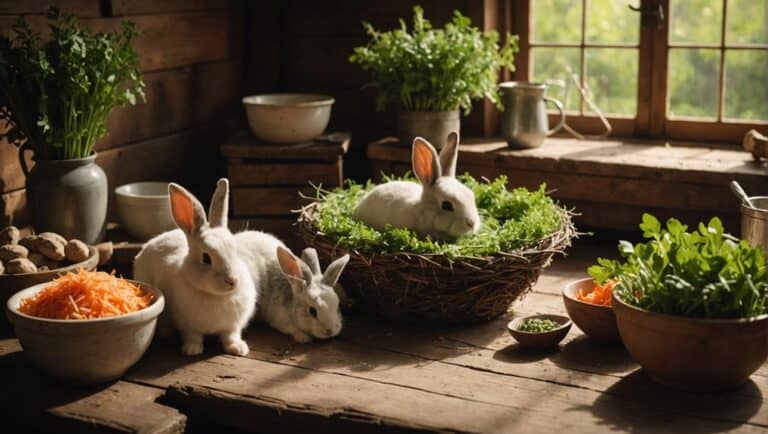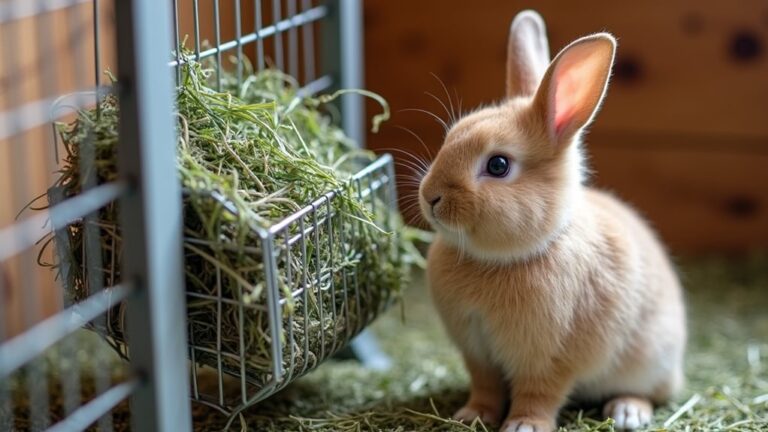When it comes to ensuring your rabbit's well-being, you might say that hay plays an essential role in their daily menu. It's not just filler; it's a crucial source of fiber that supports their digestive health and keeps their teeth in check. You may find yourself wondering what specific types of hay are best suited for your pet, or how to balance their diet effectively. The answers could greatly impact your rabbit's overall health and happiness, leading you to reflect on how you can optimize their nutrition further.
Contents
Importance of Hay in Rabbit Diet
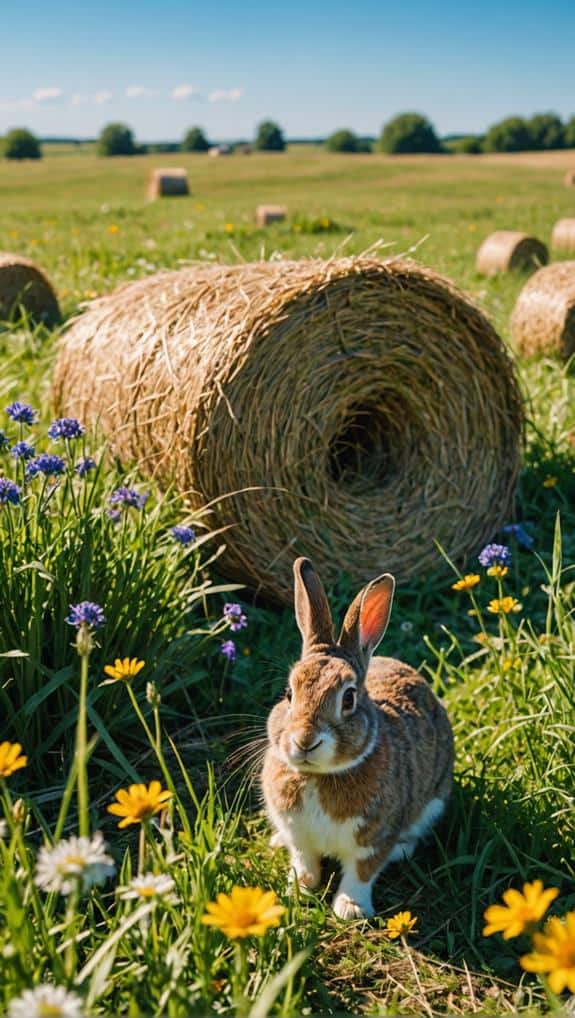
Hay is a fundamental component of a rabbit’s diet, making up about 80% of their food intake. This high-fiber food is essential for maintaining digestive health and preventing gastrointestinal issues. The fiber in hay promotes healthy gut flora, aiding in digestion and contributing to a rabbit’s overall health. In addition to supporting digestive health, hay provides essential nutrients and helps wear down a rabbit’s continuously growing teeth. Unlike other types of feed, high fiber hay encourages natural foraging behaviors, keeping rabbits mentally stimulated and active. Therefore, understanding the high fiber hay benefits for rabbits is crucial for any owner aiming to ensure their pet thrives and enjoys a long, healthy life.
Additionally, hay's rough texture aids in food movement through the digestive tract, preventing blockages and enhancing gut function, as noted in its significance in a bunny's diet.
The act of chewing hay is critical for dental health. Rabbits' teeth continuously grow, and regular consumption of hay helps wear them down naturally, preventing dental problems.
Providing unlimited access to hay also encourages natural foraging behavior, which is key for mental stimulation and reducing boredom. When rabbits engage in foraging, they exhibit healthier behaviors, contributing positively to their well-being.
Moreover, high-fiber hay plays a significant role in weight management. It helps rabbits maintain a healthy metabolism and reduces the risk of obesity, which can lead to serious health issues.
Types of Hay for Rabbits
When selecting hay for your rabbit, it's essential to understand the nutritional benefits each type offers. Hay serves as a primary fiber source critical for digestive health, and providing a variety of hay types encourages natural foraging behavior.
Timothy hay is often the go-to choice for adults due to its balanced protein and calcium levels, while Orchard grass may appeal to more finicky eaters.
Additionally, recognizing the roles of Alfalfa and Clover hay can help you tailor your rabbit's diet to their specific needs, ensuring a balanced approach for best health and well-being best nutrition balancing hay.
Nutritional Benefits of Hay
Providing a variety of hay types is important for meeting the nutritional needs of rabbits. Different hay sources offer unique nutritional benefits that contribute to a balanced rabbit diet.
Timothy hay, for instance, is particularly suitable for adult rabbits due to its low protein and calcium levels, which help prevent urinary problems while promoting healthy growth. Additionally, a high-fiber diet from hay is essential for maintaining gut health and preventing gastrointestinal issues like G.I. Stasis, ensuring overall digestive well-being preventing gastrointestinal issues.
For picky eaters, orchard grass hay provides a softer texture while still delivering crucial fiber necessary for digestive health. Alfalfa hay, while rich in protein and calcium, should only be fed to young or lactating rabbits as a treat, since it can lead to obesity and urinary issues in adults.
Incorporating various grass hay types, such as Bermuda and Meadow grass, enhances the nutrient profile and fiber content available to your rabbit. This mix encourages natural foraging behaviour, making mealtime more engaging and enjoyable.
Hay Varieties for Rabbits
Choosing the right type of hay for your rabbit can considerably impact its health and well-being. For adult rabbits, Timothy hay is the most recommended option due to its high fiber content, low protein, and lower calcium levels. This combination helps maintain a healthy weight and promotes dental health.
If your rabbit is a picky eater, consider Orchard Grass Hay; its soft texture appeals to many while still providing essential nutrients.
Alfalfa hay, although nutritious, is high in protein and calcium, making it unsuitable for adult rabbits. Its excessive intake can lead to obesity and related health problems. Similarly, Clover Hay shares these concerns and should be fed sparingly.
In addition to these options, grass hays, such as Bermuda and Meadow grass, can be beneficial. They generally have lower sugar levels and can complement your rabbit's primary hay choices, enhancing overall hay intake.
Calcium Levels in Hay
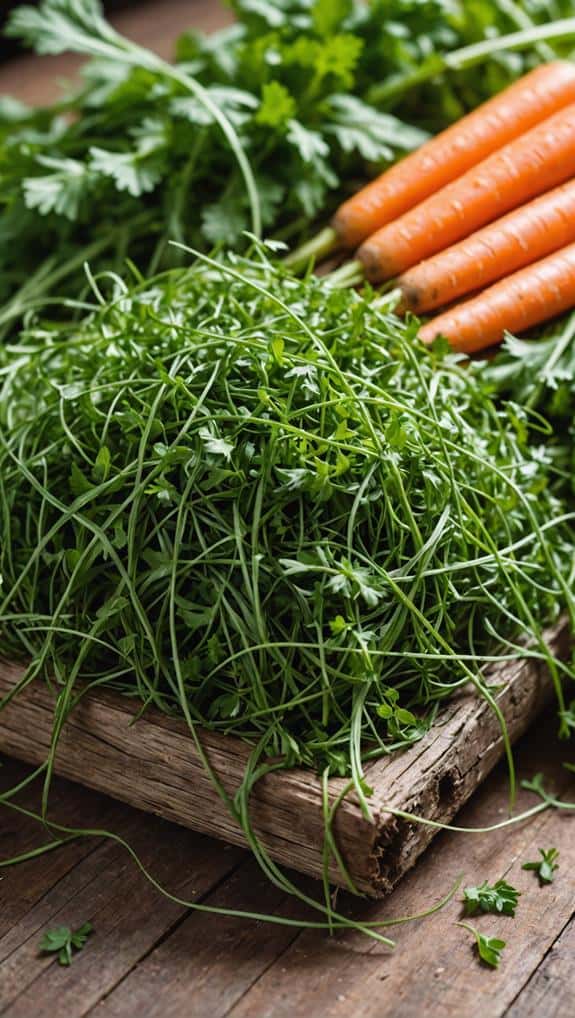
When it comes to your rabbit's diet, maintaining the ideal calcium level of approximately 0.4% is essential for preventing urinary issues.
Different types of hay, such as Lucerne and Timothy, vary considerably in calcium content, requiring careful selection based on your rabbit's specific health needs.
Regular veterinary consultations can help you adjust their diet to guarantee optimal calcium intake and overall health.
Ideal Calcium Levels
Maintaining ideal calcium levels in a rabbit's diet is essential for their overall health, with approximately 0.4% being the target to prevent urinary complications. An ideal diet incorporates hay that aligns with this calcium requirement, ensuring that your rabbit receives the necessary nutrients without the risk of health issues.
Timothy hay, recommended for adult rabbits, is low in calcium, making it a suitable option for daily feeding. On the other hand, Lucerne (alfalfa) hay is high in both protein and calcium, which means it should only be given to specific rabbits, such as lactating does or those needing weight gain. Excessive calcium intake from high-calcium hays can lead to serious conditions like urinary stones and bladder sludge.
To maintain peak rabbit welfare, it's vital to monitor calcium levels in their diet closely. Regular consultations with a veterinarian can help you adjust your rabbit's dietary calcium based on their individual health needs and life stage.
Balancing hay options will promote overall well-being, allowing your rabbit to thrive in a healthy environment.
Hay Types Comparison
Understanding the different types of hay available is key to managing your rabbit's calcium intake effectively. Each hay type varies considerably in calcium levels, impacting the health of your adult rabbits.
- Alfalfa hay: High in calcium; suitable for young rabbits or lactating does.
- Timothy hay: Contains around 0.4% calcium; ideal for adult rabbits to prevent urinary problems.
- Oaten hay: Lower in calcium but higher in sugars, making it less suitable for calcium management.
- Grass or meadow hay: Typically offers lower calcium levels, contributing to a balanced diet.
- Excessive calcium: Can cause urinary sludge and stones, emphasizing the importance of careful selection.
For adult rabbits, Timothy hay is the preferred choice due to its appropriate calcium content. Alfalfa hay's high calcium levels can lead to serious health issues like urinary problems if consumed regularly.
By understanding these hay types, you can guarantee that your rabbit's diet is balanced, promoting their overall well-being and preventing potential health complications.
Managing calcium intake through careful selection of hay types is essential for maintaining healthy adult rabbits.
Dietary Adjustments Needed
To guarantee your rabbit thrives, it's essential to make dietary adjustments based on the calcium levels in the hay you provide. The ideal calcium level for a rabbit's diet is approximately 0.4%. Selecting hay varieties that align with this target is imperative for their health.
For example, Lucerne (Alfalfa) hay is rich in protein and calcium, making it suitable for lactating rabbits or those needing weight gain. However, adult rabbits should limit their intake of this type to avoid urinary complications due to excessive calcium.
On the other hand, Timothy hay is lower in both calcium and sugar, making it a better option for adult rabbits. This choice helps maintain a healthy urinary system, reducing the risk of urinary stones and other health issues linked to high calcium levels.
Regular discussions with a veterinarian are necessary to assess the calcium content in the hay you feed and to determine any necessary dietary adjustments. Monitoring calcium intake is critical, as excessive amounts can lead to significant health complications in rabbits.
Adapting your rabbit's diet based on hay calcium levels guarantees a balanced and healthy lifestyle.
Feeding Guidelines for Hay
Providing the right amount of hay is crucial for your rabbit's health and digestion. Make sure that your rabbit consumes hay equivalent to its body size daily. Fresh hay should be provided every day, even if there are leftovers, to promote continuous fiber consumption. This is essential for best digestive functions.
To encourage your rabbit to eat more hay, consider these feeding guidelines:
- Use a litter tray or hay rack for easy access.
- Offer morning-cut hay, as its sweetness and palatability are usually higher.
- Monitor your rabbit's eating habits closely; any decrease in hay consumption could signal health issues.
- Rotate different hay types, like timothy or orchard grass, to maintain interest.
- Always provide clean, dry hay to prevent spoilage.
Challenges in Hay Consumption
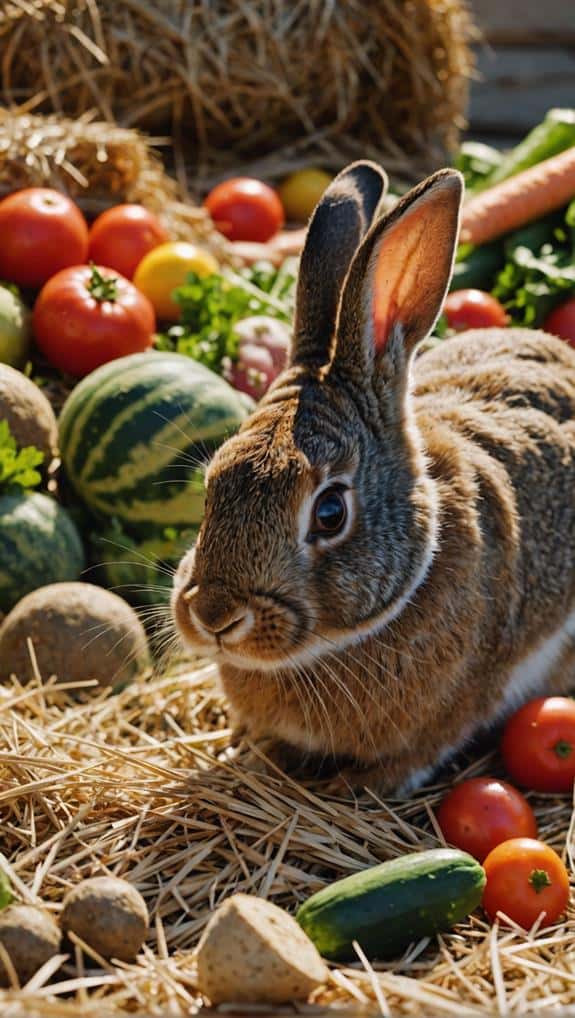
While many rabbits instinctively prefer the taste of pellets over hay, this preference can pose considerable challenges for their overall health. When you notice your rabbit declining hay consumption, it may signal underlying dental disease, necessitating a prompt veterinary evaluation.
To encourage hay consumption, gradually introduce it into their diet while decreasing pellet portions. This shift helps prevent any sudden dietary changes that could affect their digestive system.
Mixing various hay types or adding appealing flavors, such as apple juice, can enhance the attractiveness of hay for hesitant eaters. Additionally, concealing pellets or treats within hay can stimulate their natural foraging behavior, making feeding time more engaging and promoting increased hay intake.
If your rabbit's diet has primarily consisted of pellets, consider using chaff to combine textures, easing their adjustment to hay.
Nutritional Essentials for Rabbits
A rabbit's diet is fundamental for maintaining ideal health and preventing various health issues. To guarantee your rabbit thrives, focus on providing a balanced diet that emphasizes hay, which should comprise about 80% of their intake. Hay is essential for digestion, as its high fiber content prevents gastrointestinal problems.
Consider incorporating these nutritional essentials into your rabbit's diet:
- Timothy and Orchard Grass hay for maximum fiber and low protein
- Fresh vegetables like leafy greens for critical nutrients
- High-quality pellets in moderation (about 5% of the diet)
- Unlimited access to hay to encourage natural foraging behavior
- Avoidance of muesli or seed mixes to prevent obesity and digestive disorders
It's important to monitor protein and calcium levels in your rabbit's diet. Timothy and Orchard Grass hay are preferred choices because they contain lower amounts of these nutrients, promoting balanced health.
Behavioral Impact of Hay
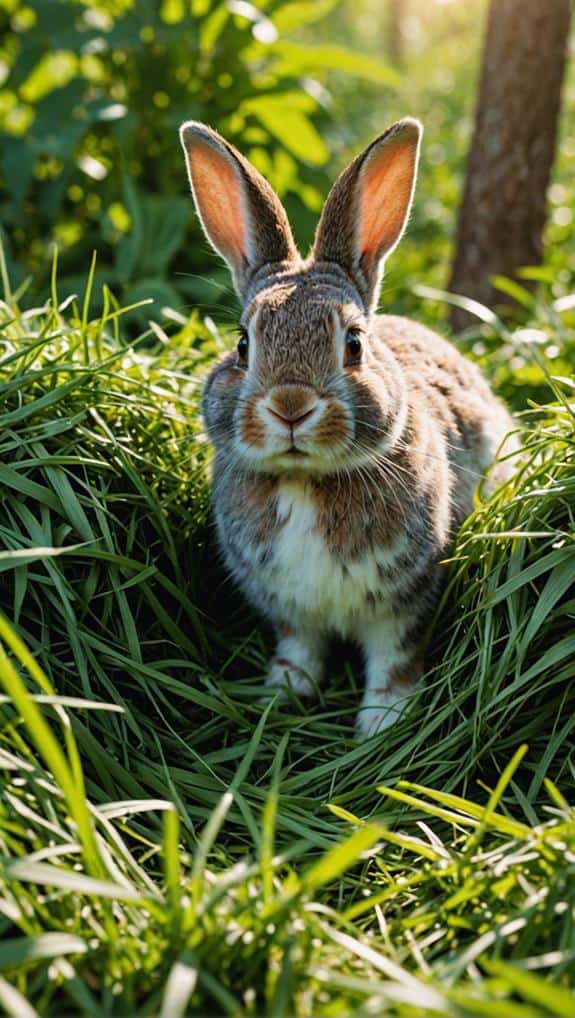
Hay plays an essential role in shaping the behavior of rabbits, greatly influencing their overall well-being. When you incorporate hay into your rabbit's diet, you'll notice increased feeding duration and higher activity levels compared to those on muesli-only diets. This shift not only enhances their physical health but also fosters natural foraging behaviors, which are essential for mental stimulation and reducing boredom.
Research shows that rabbits fed a hay-inclusive diet exhibit fewer stereotypic behaviors often seen in caged animals. This reduction supports their mental health and encourages a more active lifestyle. The higher fiber content in hay is instrumental in promoting digestive efficiency, leading to better gut health and producing larger, healthier fecal pellets.
Additionally, hay provides essential chewing activity, which is critical for maintaining dental health. Proper chewing helps prevent dental issues related to overgrown teeth, ensuring your rabbit remains comfortable and healthy.
Monitoring Rabbit Health
Monitoring your rabbit's health is fundamental for early detection of potential issues. By keeping a close watch on specific indicators, you can guarantee your domestic rabbit remains healthy and happy. Here are some significant aspects to contemplate:
- Regularly check your rabbit's faecal output; healthy feces should be round and plentiful.
- Observe eating habits; a sudden refusal to eat may signal dental problems or other health concerns.
- Watch for subtle changes in behavior or body language, as these can indicate discomfort or pain.
- Familiarize yourself with normal feces characteristics; significant changes should prompt immediate veterinary consultation.
- Educate yourself on common health issues, like Gut Stasis, to facilitate early intervention.
Being proactive about your rabbit's health can save you from more serious problems down the line. Pay attention to these key factors, as they play a pivotal role in monitoring rabbit health.
Should you notice any concerning signs, don't hesitate to arrange a veterinary consultation. Remember, your vigilance can make all the difference in your rabbit's well-being.
Where to Buy Quality Hay
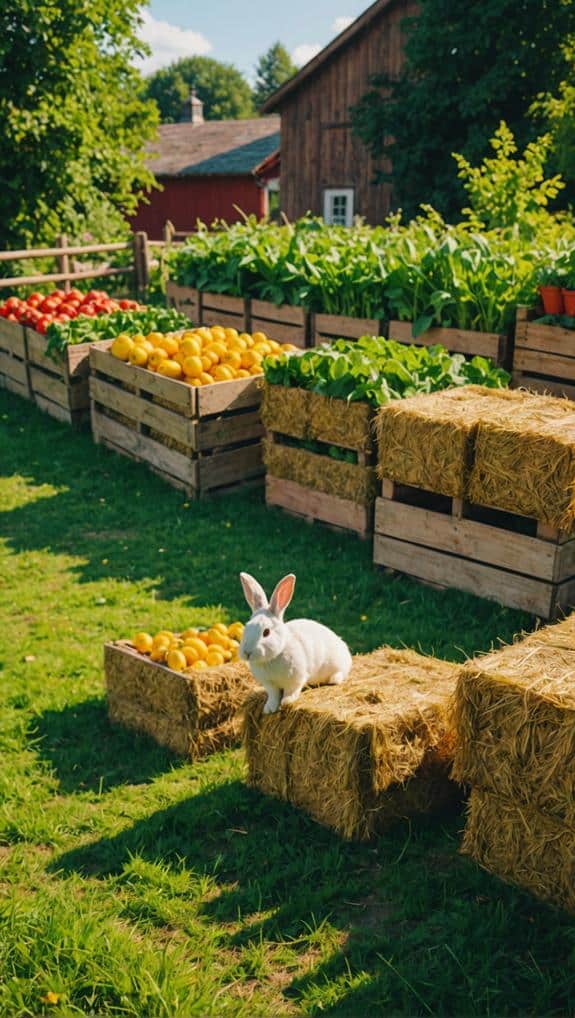
When it comes to guaranteeing your rabbit receives the best nutrition, sourcing quality hay is vital. Start by exploring local purchasing options, such as those available through the House Rabbit Resource Network, which connects owners in Pflugerville, TX, with reliable hay sources. This guarantees you're getting hay that meets the nutritional needs of your rabbits.
If you prefer the convenience of online shopping, consider Small Pet Select. They offer a variety of high-quality hay suitable for rabbits, complete with delivery options that make your life easier.
Another reputable option is Oxbow Hay Company, known for their extensive range of hay and rabbit supplies, focusing on quality assurance in every product.
While local pet stores may carry hay, it's important to check the quality. Hay can notably vary between suppliers, so take the time to inspect it before purchasing.
For adult rabbits, prioritize hay types like Timothy and Orchard Grass, as they provide essential nutrients. By carefully selecting where to buy your hay, you can guarantee your rabbits thrive on a diet that supports their health and well-being.
Final Thoughts
To summarize, providing hay as a staple in your rabbit's diet is essential for their overall health and well-being. For instance, consider a rabbit that primarily fed on pellets developed dental issues and obesity due to inadequate fiber intake. By switching to a hay-rich diet, you can promote better digestion, dental health, and prevent serious health complications. Always make certain your rabbit has access to a variety of high-quality hay to fulfill their nutritional needs and encourage natural behaviors.


